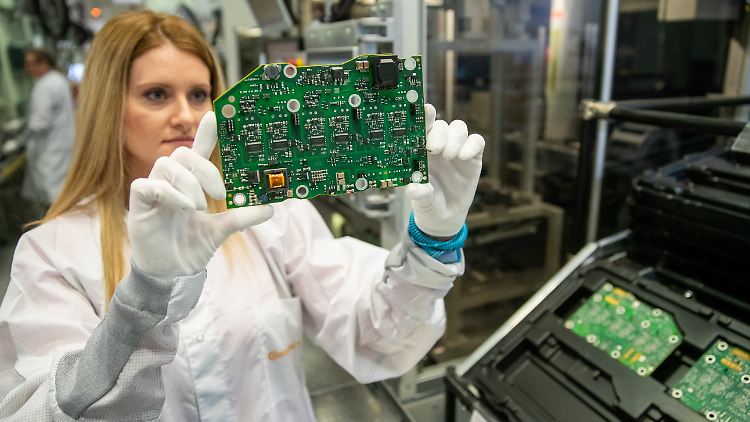The supplier Schaeffler is cutting 1000 jobs in Germany. Throughout the automotive industry, electromobility will cost tens of thousands of jobs. According to experts, it is possible to compensate for this with new jobs. Opportunities lie primarily in digitization.
At the supplier Schaeffler, what the automotive industry and trade unionists have been warning about for years is coming to pass: 1,300 jobs are being cut, 1,000 of them in Germany – with reference to electromobility. “Many suppliers are facing what is probably their biggest entrepreneurial challenge to date,” says Hildegard Müller, President of the German Association of the Automotive Industry (VDA), when asked by ntv.de. “They have to develop a new business model while still building components for the combustion engine.” Tens of thousands of jobs are at stake in the German auto industry as a result of the transformation away from the internal combustion engine to the e-motor. According to industry experts, these losses can be offset elsewhere. But only under a number of conditions, both on the part of the industry and on the part of policymakers. First and foremost: more speed.
Significantly fewer people are needed to produce electric cars; the engine of a combustion engine, with around 1,000 components, has about four times as many as an electric drive. According to the VDA, around half of the jobs in the German automotive industry are linked to the combustion engine. Industry expert Stefan Bratzel predicts that the number of jobs in the powertrain sector at carmakers and suppliers will fall by 15 to 20 percent – which would mean 120,000 to 160,000 jobs in the industry. In addition, there will be job cuts in the automotive trade and service, as the head of the Center of Automotive Management in Bergisch Gladbach emphasized in an interview with ntv.de. Up to now, around 450,000 people have been employed in this sector, but service and repair requirements for e-cars are also significantly lower than for combustion engines.
On the other hand, electric vehicles are creating new demand for jobs, for example in the energy sector, such as for the charging infrastructure. According to Bratzel, the automotive industry can also create new jobs, particularly in the digital sector. However, German companies would have to become much stronger here. Software and digital services – up to and including autonomous driving – have so far been dominated by non-European suppliers, especially from the USA.
“Industry must make its contribution to climate protection”.
If they succeed in catching up with them, the job losses in the automotive industry can possibly be compensated for by new jobs in the industry as well as in other sectors of the economy. However, according to Bratzel, German companies will also have to become stronger in cell production. The automotive expert is less confident about the automotive trade and service. If the number of internal combustion vehicles declines in the late 2020s and early 2030s, these companies will need additional business areas.
Automotive expert Ferdinand Dudenhöffer is more optimistic: “We will be among the winners,” says the head of the CAR Center Automotive Research in Duisburg in an interview with ntv.de. “If you add the new jobs in battery production, in the digital sector and in the charging infrastructure, the plus effects will be greater than the minus effects,” Dudenhöffer estimates. He does not think much of concrete figures in this case, as many developments cannot be estimated, especially in terms of time.
Job cuts as a result of electromobility are a matter of years, but are now happening faster than many thought, as both Schaeffler and Bratzel note. “It also has to happen faster because the industry has to do its part to protect the climate,” Bratzel thinks. In his opinion, the automotive industry has underestimated the dynamics of electromobility. “Until 2015/16, people didn’t believe in it and therefore waited too long.” But both customer acceptance and regulations have increased, he says. “The industry was backward-looking instead of forward-looking and made a mistake,” Bratzel says. “But it can still make up for the mistake.” VW stepped on the gas after the diesel crisis, he says, and Mercedes and BMW have also caught up in the meantime.
China and U.S. lure with subsidies
But according to Bratzel, the supplier industry in particular still needs to make adjustments when it comes to e-mobility. According to Dudenhöffer, Schaeffler, for example, stuck with the combustion engine for too long and entered new fields very late. In principle, however, the German automotive industry is well positioned in his eyes – if it weren’t for politics. In his view, Germany is standing on the brakes in such a way that German automakers and suppliers will end up finding better conditions in China and the U.S. to set up their companies. VDA President Müller warns: “The USA and China are tempting us with subsidies and significantly lower energy prices. Meanwhile, Berlin and Brussels are already busy again with new ordinances and regulations that are putting the industry under increasing pressure: We are in danger of losing our international competitiveness.”
“We have made the wrong political decisions,” says Dudenhöffer. He is critical of the planned abolition of subsidies for plug-in hybrids and the reduction in funding for pure electric vehicles. The expansion of e-mobility will stall in the next few years, which in turn will slow down investments in the necessary infrastructure.
Chinese manufacturers are pushing into the European market
The world’s highest energy prices in Germany are also a major brake on progress, says Dudenhöffer. In his view, there are too many exceptions and generally too much bureaucracy in the current efforts to lower energy prices. Energy costs are crucial for the production of batteries and cells, for example. VDA President Müller is calling for rapid relief for suppliers, especially in terms of electricity prices: “Generation capacities must be expanded and the electricity tax reduced to the European minimum.”
Dudenhöffer also calls for Germany to open up more to China. In the case of e-cars, the German auto industry has now faced strong competition from there. Bratzel stresses that locally, Chinese manufacturers are already strong competitors. “They will also try to enter the market in Europe – and they don’t have a bad chance.” China is already driving at eye level, he says. Tesla, he says, is even years ahead. Bratzel is nevertheless optimistic: “If German industry has recognized issues, it is also strong. However, it must now give significantly more power.”
Source of the news: https://www.n-tv.de





